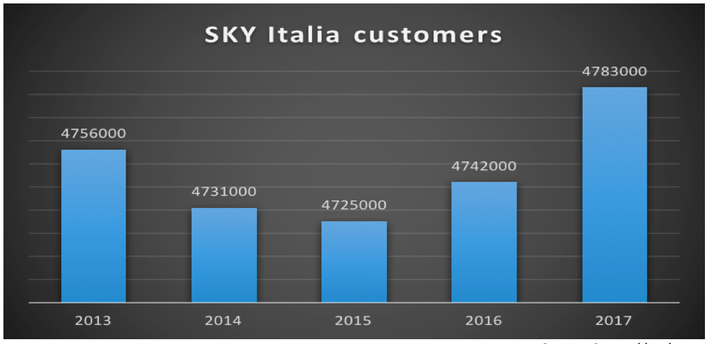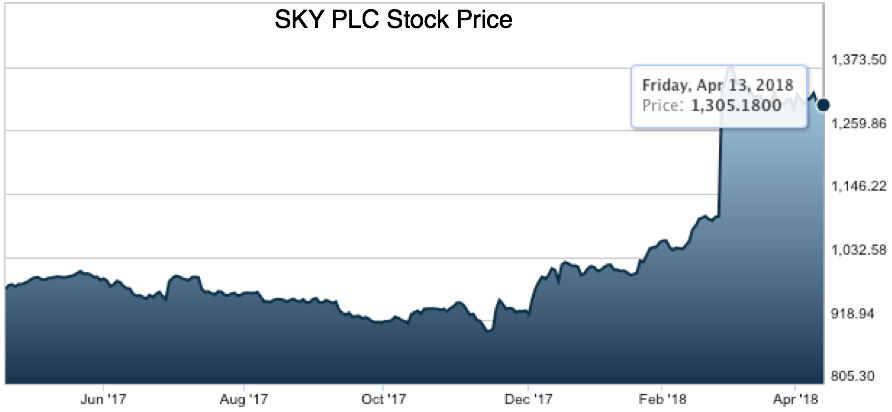Only a few hours before the Easter weekend began, Sky and Mediaset announced a resounding deal that is going to change multimedia offer balances in Italy.
After years of fierce competition, the two groups have realized that in a time when their sector is being disrupted by new technologies and platforms like Netflix, the only way to survive is a strong and long lasting cooperation.
According to a Mediaset’s statement, Sky Italia’s customers will have access to Mediaset Premium’s Cinema and Serie channels.
In addition, Sky Italia will be able to use Mediaset’s pay-TV platform for digital terrestrial television (DTT) distribution. This will allow Sky Italia to create its own pay-TV offer on DTT, combining Sky, Fox and nine Mediaset channels, also taking advantage of Ei Towers’ band.
Mediaset’s Premium business, with under 2 million subscribers, has struggled to make a return on its large investments for broadcasting rights to Champions League and Italian Serie A soccer matches, and over time it has lost market share to Sky. It is now rethinking its business model, trying to focus on the free TV channels, the field where it has got the best results over the past years, and this agreement looks like an important step in the right direction.
After years of fierce competition, the two groups have realized that in a time when their sector is being disrupted by new technologies and platforms like Netflix, the only way to survive is a strong and long lasting cooperation.
According to a Mediaset’s statement, Sky Italia’s customers will have access to Mediaset Premium’s Cinema and Serie channels.
In addition, Sky Italia will be able to use Mediaset’s pay-TV platform for digital terrestrial television (DTT) distribution. This will allow Sky Italia to create its own pay-TV offer on DTT, combining Sky, Fox and nine Mediaset channels, also taking advantage of Ei Towers’ band.
Mediaset’s Premium business, with under 2 million subscribers, has struggled to make a return on its large investments for broadcasting rights to Champions League and Italian Serie A soccer matches, and over time it has lost market share to Sky. It is now rethinking its business model, trying to focus on the free TV channels, the field where it has got the best results over the past years, and this agreement looks like an important step in the right direction.
The Milan-based group added that it will have the option to hand over to Sky Italia, between November and December of this year, full control of a new company, to which the “technical part” of Premium (i.e. maintenance, clients assistance and operational assets) would be transferred. Premium would be still existing but only as editor.
No figures have been provided, but according to some evaluations Mediaset would benefit by nearly 400 million euros over the next 4-5 years.
As a consequence, after the Easter break, the market has positively reacted to the terms of the deal (indeed Mediaset’s shares price rose by 6,43%), also hoping it will set the ground for further collaborations in the future.
However, this was only the latest piece of news regarding Sky’s, and in particular Sky Italia unit’s, expansion.
In fact, the day before, Murdoch’s company had formed an important alliance with Open Fiber. The company, owned by the Italian state lender Cassa Depositi e Prestiti and Enel, is laying the ultrafast broadband network in more than 270 urban areas in the country.
The access to the fiber-to-the-home (FTTH) network will allow Sky Italia to add stream programmes to the existing satellite offer and to compete effectively with online contents providers.
The new services will be distributed through a new version of Sky Q, starting from 2019, that will work both by satellite and internet, providing many new functionalities to the costumers.
Moreover, it is worth mentioning the most important transaction carried out by Sky in March: the deal with the company that seemed to be the toughest competitor in the market, the streaming media giant Netflix.
The agreement provides for Netflix app to be integrated in Sky Q bringing together all the shows of both the companies for the costumers who will subscribe the new pack.
The deal looks like an answer to the acquisition of Fox cinema and tv by Disney and the announced mega-streaming platform to be created by the new group, and looking at numbers it seems to have much more potential to became world leader in the industry.
Lastly, all the aforementioned events are happening while a harsh battle for the control of Sky is likely to be coming on in the near future. British authorities are still reviewing the one-year-old 21st Century Fox’s bid for the remaining 61% of Sky, but another offer has already been made by Comcast. Comcast – the largest broadcasting and cable television company in the world and the second-largest pay-TV company in the United Statesafter the acquisition of NBCUniversal in 2011 – offered $31 billion-£12.50 per share, 16% more than the £10.75 offered by Fox, whose bid is also struggling to obtain the approval of the UK’s Competition and Market Authority. If Comcast succeded, such an acquisition would completely change the game and create a multimedia emperor with apparently no rivals in the world.
No figures have been provided, but according to some evaluations Mediaset would benefit by nearly 400 million euros over the next 4-5 years.
As a consequence, after the Easter break, the market has positively reacted to the terms of the deal (indeed Mediaset’s shares price rose by 6,43%), also hoping it will set the ground for further collaborations in the future.
However, this was only the latest piece of news regarding Sky’s, and in particular Sky Italia unit’s, expansion.
In fact, the day before, Murdoch’s company had formed an important alliance with Open Fiber. The company, owned by the Italian state lender Cassa Depositi e Prestiti and Enel, is laying the ultrafast broadband network in more than 270 urban areas in the country.
The access to the fiber-to-the-home (FTTH) network will allow Sky Italia to add stream programmes to the existing satellite offer and to compete effectively with online contents providers.
The new services will be distributed through a new version of Sky Q, starting from 2019, that will work both by satellite and internet, providing many new functionalities to the costumers.
Moreover, it is worth mentioning the most important transaction carried out by Sky in March: the deal with the company that seemed to be the toughest competitor in the market, the streaming media giant Netflix.
The agreement provides for Netflix app to be integrated in Sky Q bringing together all the shows of both the companies for the costumers who will subscribe the new pack.
The deal looks like an answer to the acquisition of Fox cinema and tv by Disney and the announced mega-streaming platform to be created by the new group, and looking at numbers it seems to have much more potential to became world leader in the industry.
Lastly, all the aforementioned events are happening while a harsh battle for the control of Sky is likely to be coming on in the near future. British authorities are still reviewing the one-year-old 21st Century Fox’s bid for the remaining 61% of Sky, but another offer has already been made by Comcast. Comcast – the largest broadcasting and cable television company in the world and the second-largest pay-TV company in the United Statesafter the acquisition of NBCUniversal in 2011 – offered $31 billion-£12.50 per share, 16% more than the £10.75 offered by Fox, whose bid is also struggling to obtain the approval of the UK’s Competition and Market Authority. If Comcast succeded, such an acquisition would completely change the game and create a multimedia emperor with apparently no rivals in the world.
Nevertheless, it is too early to say Fox will just stand by. Sky’s share price is now around £13, sign that analysts expect a bid war to be prompted by a new offer by Murdoch, maybe due to Disney’s pressure.
In any case it is going to be a very interesting period for Sky’s shareholders.
In any case it is going to be a very interesting period for Sky’s shareholders.
Lorenzo Monticone

